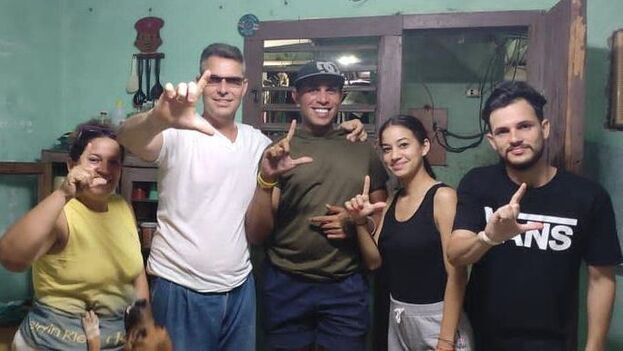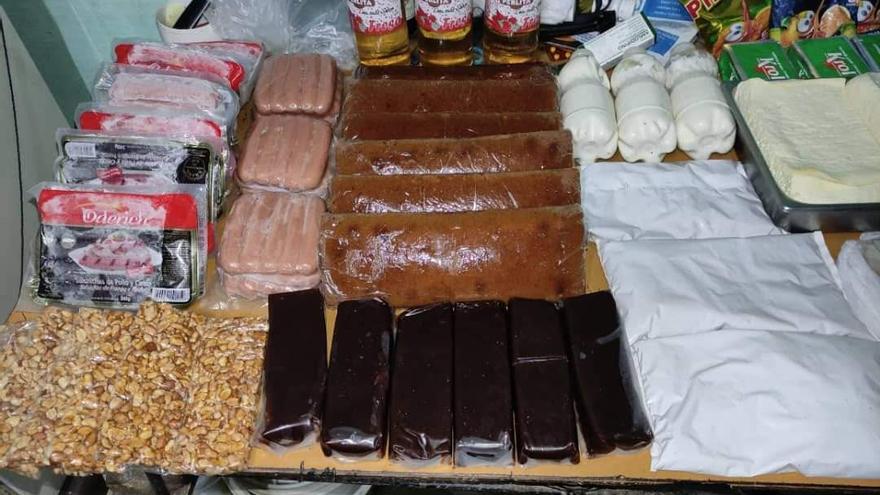
![]() 14ymedio, Yankiel Gutiérrez Faife, Camajuaní, 26 November 2022 — Without the help of charitable organizations and private donors, prisoners would be on the verge of starvation in Cuban prisons, where they receive from the State the bare minimum to survive. “Lately the contributions have been greatly reduced,” laments Jonatan López, brother-in-law of political prisoner Andy García Lorenzo, who inspired the Funds for the Victims of Communism initiative. “We have up to 110 beneficiaries, but now we have resources for only about 44 detainees.”
14ymedio, Yankiel Gutiérrez Faife, Camajuaní, 26 November 2022 — Without the help of charitable organizations and private donors, prisoners would be on the verge of starvation in Cuban prisons, where they receive from the State the bare minimum to survive. “Lately the contributions have been greatly reduced,” laments Jonatan López, brother-in-law of political prisoner Andy García Lorenzo, who inspired the Funds for the Victims of Communism initiative. “We have up to 110 beneficiaries, but now we have resources for only about 44 detainees.”
“We’re a bridge for delivering food to prisoners in Cuba. We receive small donations from people who are sympathetic to the cause and help low-income families,” explains Jonatan López in conversation with 14ymedio.
“Andy knew what it was to go to bed hungry, without being able to satisfy himself with the small portion of food they get in jail,” López says. On each visit, they assure, they tried to bring the young man everything he needed. “But he always asked for more, because he wanted to share his food with the others.”
Funds for the Victims of Communism — promoted on social networks under the name of Help the Brave of 11J [11 July 2021 protests] — is responsible for raising money so that families can provide prisoners with food, toiletries, cigarettes and everything they need during their imprisonment.

The economic crisis on the Island and the increase in the price of food and basic necessities have had a negative impact on the situation of prisoners, and it’s difficult to provide them with the bag of supplies during family visits.
The visibility of the García Lorenzo family, following the multiple complaints made by its members, contributed to the project gaining notoriety and interest from donors. After initially refusing to send money, they decided — in December 2021 — to create a structure to collect funds.
The initial recipients were 15 families of political prisoners in Villa Clara, but the direct transmissions of Roxana García Lorenzo — Andy’s sister — and the complaints of other activists allowed increasing the number of donations and expanding the scope of the organization.
At the moment, the funds are destined for the families of 44 inmates in the western and central regions of the Island, for whom 3,000 pesos per month are deposited on their cards to buy products intended to cover their basic needs. The same amount has been given, at least once, to 110 prisoners.
Jonatan López, recently exiled in Germany, explained to 14ymedio that “to assist 110 prisoners, 4,500 to 5,000 dollars must be paid monthly, in order to distribute 6,000 pesos to each prisoner. And even so, their needs are not fully met, but it would be a huge relief for those families who, in many cases, have run out of their main economic livelihood,” he said, alluding to the fact that the work of many of the young people arrested was what supported their families.
The García Lorenzos manage the funds and ensure that they are distributed fairly. Activist Samuel Rodríguez Ferrer, a resident of the United States, is responsible for managing the PayPal and Zelle accounts opened for donations, which are then sent in their entirety to Cuba, without subtracting administrative or promotion expenses from the initiative. Ways have been found, says the activist, so that “the dictatorship does not access this currency” at the time of the transfers.
In addition, as they clarify on their website, the organization “is not political, nor is it affiliated with any party, organization or government. We do not receive a federal grant from the United States, or from any other country. Donations come from individuals and independent companies.”
Jonatan López records the donations in a public Excel document, to ensure transparency, while Pedro López, his father — also in the situation of asylum seeker in Germany — and his wife, Roxana García, from Santa Clara, are responsible for managing the organization. Through different channels, with the help of people traveling to the Island, the money reaches the families of the inmates.
“This project is so that they don’t feel alone, and they know that there are people outside and inside helping them,” Pedro López explains to 14ymedio. “You go against the dictatorship, they try to isolate everyone who dissents, and one of the ways is to tell them that they are alone. They try to demoralize them,” he says.
Despite their exile, Pedro and Jonatan López took measures so that the project didn’t stop. So far, they say, State Security has not confiscated their supplies, which in some cases are transported on national buses.
“It’s not difficult to work from the outside. We created an infrastructure made up of the same relatives, so that it wouldn’t stop when we left,” Pedro López says.
The work of the organization has not been without controversy. Several opponents have opined that the project “accommodates the relatives of prisoners,” which prevents them from “protesting” for the freedom of their relatives. These criticisms “do not make sense,” says Jonatan López. “The funds barely alleviate the situation of the families, and, in addition, the prisoners are not to blame for not assuming a ’frontal position’ against the regime in their homes.”
“We believe that it’s unfair to deprive them of this help, which is only the most basic, food, because their families don’t want to protest,” added the young man who, exiled in Germany due to pressure from State Security, confirmed to this newspaper his willingness to continue working on the project, combined with other initiatives such as I lend you my voice, Justice 11J, Where you fall, I’ll pick you up and the Accompaniment Groups of the Cuban Conference of Clergy (Concur).
For her part, Roxana García — known for her strong denunciations of the Government for the harassment of her brother — remains in Cuba, along with her parents, to continue demanding his freedom and that of the almost 1,000 political prisoners of the Island.
Several relatives of the prisoners have expressed their gratitude to the Funds for the Victims of Communism. Yanet Rodríguez from Holguin pointed out that the project has provided “help to the east of the country,” since most of the initiatives of this type are concentrated in the western region or the main cities of the Island.
Saily Núñez, wife of protester Maykel Puig, described the work of the organization as “extremely transparent,” while Niurka Ricardo, mother of prisoner Mario Josué Prieto, described the project as “something extraordinary and very human,” since it guarantees the food and medicines that are sent in the jabito (“little bag) to the inmates.
Translated by Regina Anavy
____________
COLLABORATE WITH OUR WORK: The 14ymedio team is committed to practicing serious journalism that reflects Cuba’s reality in all its depth. Thank you for joining us on this long journey. We invite you to continue supporting us by becoming a member of 14ymedio now. Together we can continue transforming journalism in Cuba.
